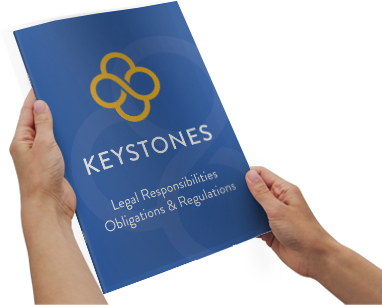The UK Renters Reform Bill 2025 is set to bring significant changes to the rental landscape. This legislation aims to completely change the rental industry, creating a safer and fairer environment for both tenants and landlords. As a landlord, it’s important to understand these changes in the law so you can stay ahead.
Key features of the bill include:
- Abolition of Assured Shorthold Tenancies (ASTs)
- Elimination of ‘no-fault’ evictions
- Implementation of rent control measures
For landlords with Buy to Let properties, this is a great opportunity. Keeping your UK Residential Buy to Let can be beneficial if you know how to handle these upcoming changes. It’s important to be prepared, especially with the free Property Healthcheck offered by Keystones. This service makes sure your investments stay compliant and competitive in a constantly changing market. Stay informed and proactive for continued success in the evolving rental industry.

Understanding the Renters Reform Bill
The Renters (Reform) Bill represents a major overhaul in UK rental legislation aimed at fostering a fairer, more balanced relationship between landlords and tenants. Among its pivotal components is the abolition of Assured Shorthold Tenancies (ASTs). This change seeks to replace ASTs with a tenancy framework that enhances tenant security, shifting the dynamics of the rental market significantly.
Another key element is the termination of ‘no-fault’ evictions, wherein landlords could previously evict tenants without providing a reason. Under the new bill, landlords must present valid reasons for evictions, protecting tenants from abrupt displacement and contributing to greater housing stability.
Rent control measures are also introduced, designed to regulate rent increases more stringently. These measures aim to prevent disproportionate rent hikes, ensuring affordability for tenants while maintaining fairness for landlords.
Legislative Journey Through Parliament
The Renters Reform Bill’s journey through Parliament began with its introduction in the House of Commons in May 2023. From there, it proceeded through various readings and committee discussions before moving to the House of Lords for further scrutiny. Each stage within these houses involves thorough debate and possible amendments, ensuring comprehensive examination before the bill progresses.
Timeline for Royal Assent and Implementation
The process anticipates receiving Royal Assent by October 2024, marking its transition into law. However, specific provisions within the bill may not see implementation until mid-2025. This staggered approach allows time for stakeholders—landlords, tenants, and property managers—to prepare adequately for the impending changes.
Understanding these legislative nuances helps landlords navigate this evolving landscape effectively, positioning their investments strategically amidst these regulatory shifts. The Renters Reform Bill stands as one of the most significant legislative efforts in recent times, reshaping how residential lettings operate across the UK.
Strengthened Tenant Protections Under the New Legislation
The Renters Reform Bill introduces significant enhancements to tenant protections, redefining the framework of landlord responsibilities and tenant rights. Key measures include:
1. Landlord Responsibilities
The legislation mandates landlords to uphold heightened standards of tenant rights. This includes providing safe living conditions and adhering to anti-discrimination measures that ensure fair treatment for all tenants, irrespective of their background or circumstances.
2. Allowing Pets in Rentals
Recognizing pets as integral parts of many families, the bill introduces provisions that allow tenants to request permission to keep pets in rental properties. While landlords can still impose reasonable conditions, the reform aims to ease the restrictions against pet ownership in rented homes.
3. Advance Rent Payments
The new regulations offer tenants greater flexibility regarding advance rent payments. This change empowers tenants by allowing them to negotiate payment schedules that better align with their financial situations, potentially reducing financial stress and enhancing tenancy stability.
These measures collectively aim to create a more equitable rental market, ensuring both landlords and tenants can coexist with mutual respect and understanding. By addressing key concerns such as discrimination and tenant security, the Renters Reform Bill reinforces a commitment to improved living standards across the UK rental sector.
Preparing for Changes as a Landlord
Adapting to the landlord redress scheme is crucial as the UK Renters Reform Bill in 2025 introduces new dynamics in landlord-tenant relationships. This mandatory scheme requires landlords to address complaints and disputes effectively, thus fostering a fairer rental market. Embracing this change ensures landlords are prepared for tenant grievances, promoting transparency and accountability.
To align with improved rental property standards, landlords need to focus on housing quality reform. Ensuring compliance involves:
- Regular property maintenance
- Adherence to health and safety regulations
- Meeting energy efficiency standards
These steps not only enhance tenant satisfaction but also safeguard landlords from potential legal issues.
Conducting a Property Healthcheck with Keystones offers significant advantages. This free service provides landlords with a comprehensive assessment of their property’s condition, identifying areas that require attention before they become problematic. The process typically includes:
- Initial Consultation: Understanding specific landlord needs and concerns.
- Detailed Inspection: Evaluating structural integrity, safety features, and compliance with legal standards.
- Actionable Recommendations: Offering practical solutions for necessary improvements or repairs.
Utilising a Property Healthcheck can prevent future disputes under the new landlord redress scheme by ensuring properties meet all required standards.
By actively preparing for these changes, landlords position themselves to navigate the evolving landscape successfully. Focusing on maintaining high-quality rental properties and engaging with redress mechanisms will be pivotal in adapting to the upcoming reforms effectively.
Understanding Eviction Processes Under the Renters Reform Bill
The introduction of the Renters Reform Bill brings about significant changes to eviction processes. One of the key changes is the elimination of ‘no-fault’ evictions, which previously allowed landlords to end tenancies without providing a reason. This change aims to improve tenant security and reduce concerns about retaliatory evictions.
Key Changes Introduced by the Renters Reform Bill
The Renters Reform Bill introduces several important changes to eviction processes:
- End of ‘no-fault’ evictions: Landlords will no longer have the ability to terminate tenancies without providing a valid reason.
- Requirement for valid reasons: Landlords must now present legitimate grounds for eviction, such as breaches of tenancy agreements or situations where the landlord needs to sell the property.
- Role of the Private Rented Sector Landlord Ombudsman: Disputes between landlords and tenants will be resolved by this ombudsman, ensuring fair arbitration and potentially preventing lengthy legal battles.
These reforms signify a move towards a more balanced relationship between landlords and tenants. By understanding these new eviction processes, landlords can better navigate their responsibilities while ensuring compliance with the evolving legal framework.
Impact on the Buy to Let Market in Romford and Essex After the Reforms
The upcoming Renters Reform Bill is set to create ripples across the UK buy to lets market, particularly in areas like Romford and Essex. These regions, known for their vibrant property markets, will experience both opportunities and challenges as landlords adapt to new regulations.
Opportunities:
- Enhanced Tenant Security: With greater tenant protections, such as the end of ‘no-fault’ evictions, Romford property and Essex lettings may become more attractive to potential renters seeking stability. This could increase demand in these areas, providing a steady rental income for landlords.
- Improved Standards: The push for better rental property standards aligns with the expectations of modern tenants looking for quality accommodations. Landlords who invest in enhancing their properties stand to benefit from higher occupancy rates and potentially increased rental values.
Challenges:
- Regulatory Compliance: Landlords in the Romford and Essex regions must navigate new compliance requirements, including rent control measures and participation in the landlord redress scheme. This necessitates a keen understanding of legislative changes to avoid penalties.
- Financial Adjustments: The introduction of rent controls may limit landlords’ ability to raise rents freely. This could impact profitability, requiring strategic planning around expenses and investment returns.
Understanding these dynamics is crucial for landlords aiming to thrive in a post-reform landscape. By staying informed on Romford property market trends and Essex lettings post-reform strategies, landlords can position themselves advantageously amidst evolving regulations.
Financial Considerations for Landlords with New Regulations in Place
Navigating the Renters Reform Bill of 2025 demands landlords understand new financial dynamics, particularly concerning rent increase notice periods. Under this legislation, landlords must adhere to stricter guidelines when planning rent adjustments. This includes providing tenants with ample notice before any rent increase takes effect, ensuring transparency and fairness.
Key considerations include:
- Notice Period Regulation: Landlords are required to issue a formal notice period before implementing rent increases. This notice period is designed to prevent sudden financial burdens on tenants.
- Housing Quality Reforms: These reforms necessitate additional investment in property maintenance and upgrades to meet enhanced standards. While this might initially increase costs for landlords, it also promises long-term benefits such as reduced vacancy rates and higher tenant satisfaction.
- Potential Costs: Compliance with the bill may incur various costs related to improving property standards and adhering to new regulations. Budgeting for these expenses becomes crucial to maintaining profitability.
Understanding these financial implications helps landlords make informed decisions and remain compliant while safeguarding their investments.
Resources and Support Available for Landlords Navigating Changes Under The Renters Reform Bill
Landlords facing the upcoming changes brought about by the Renters Reform Bill have several resources they can turn to for assistance.
Key Services
Goodlord and Vouch are two key services offering comprehensive support during this transition:
- Goodlord provides landlords with tools to streamline their lettings process, ensuring compliance with new regulations efficiently.
- Vouch offers tenant referencing solutions that help in maintaining high-quality tenant relationships and aligning with new legal standards.
Role of Organizations
Organizations like Shelter play a crucial role in supporting both tenants and landlords. Shelter provides guidance on housing rights and responsibilities, facilitating a smoother adaptation to the legislative shifts. Their resources can be invaluable in understanding nuanced landlord-tenant dynamics under the new framework.
Importance of Staying Informed
Staying informed is vital. Regular updates on the legislative process can be accessed through government publications and industry newsletters. Keeping abreast of these updates ensures landlords remain compliant and can make strategic decisions, such as whether to continue or exit the buy-to-let market. The possibility of some landlords considering selling should not come as a surprise, given the comprehensive nature of these reforms.
Engaging with these resources equips landlords to navigate regulatory changes effectively while safeguarding their investments.
Conclusion: A Proactive Approach Towards Successful Buy-To-Let Investments Amidst Regulatory Changes
The future of renting in the UK depends on how well we adapt. As a landlord, adjusting your strategy according to the 2025 Renters Reform Bill can help you protect your investments. To navigate this changing environment successfully, focus on long-term planning:
- Stay informed and proactive about regulatory changes.
- Use tools like Keystones’ Property Healthcheck to ensure compliance and maintain property quality.
By making these adjustments now, you’ll not only safeguard your assets but also improve your position in a reformed rental market that values tenant welfare and sustainable tenancy management.
More from the Keystones learning hub
Keep updated with what's going on in your local area. Our latest news provides up-to-date information on everything regarding the local property market, for everyone including homebuyers, sellers, tenants, and landlords.
The Landlord Ombudsman & Renters Rights Bill – We Explain it All

3 June, 2025
It’s a great time to keep your UK Residential Buy to Let

20 May, 2025

Come and see us face to face
Keystones are Open 6 days a week. Pop in, have a Tea or Coffee as we always have people on hand to help you.
Keystones Property
-
Keystones Property Collier Row
13 Clockhouse Lane, Collier Row, Romford, Essex, RM5 3PH, United Kingdom -
Email: [email protected]
-
Telephone: 01708 909 100





